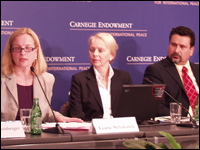Registration
You will receive an email confirming your registration.
IMGXYZ947IMGZYXRecent financial and food price crises have forced policy-makers to question conventional thinking on how agricultural markets work, why they sometimes fail, and what role governments should play when they do.
The Carnegie Endowment and the Heinrich Boll Foundation co-hosted a panel of experts to discuss sustainable agriculture policies. Discussants offered wide-ranging and sometimes contradicting recommendations for avoiding a future global food crisis. Proposals included providing minimum remuneration to farmers, forming agricultural policies with multiple-bottom lines, and exploiting opportunities that biofuel subsidies might offer developing country farmers. The event was moderated by Liane Schalatek, Associate Director of the Heinrich Boll Foundation North America.
The Crisis in Context
Sandra Polaski, Director of the Trade, Equity, and Development Program at the Carnegie Endowment for International Peace, presented an overview of the food crisis, highlighting two major causes of the recent spike in prices: underinvestment in developing-country agriculture and market imperfections in the agricultural sector. She recommended that developing countries adopt policies to promote greater food production for domestic and regional consumption. Governments must also ensure acceptable minimum levels of remuneration to their farmers. In some low-income economies with few fiscal resources, trade barriers may be the only policy instrument available.
Steve Suppan, Senior Policy Analyst at the Institute for Agriculture and Trade Policy, and Simplice Davo Vodouhe, Coordinator of the Organisation Beninoise pour la Promotion de l’Agriculture Biologique, presented the main proposals of the International Assessment of Agricultural Knowledge, Science and Technology for Development. The multilateral effort, agreed upon by over 58 countries, addresses eight long-term issues affected by agriculture. Suppan highlighted three: climate change, human health, and women’s issues. Vodouhu stressed the report’s central recommendation: agricultural policy ought to be shaped by multiple bottom-lines, aimed at maximizing not only yields, but also employment, health, and environmental outcomes.
Opportunities for Small Producers
Daniel De La Torre Ugarte, Professor and Associate Director at the Agricultural Policy and Analysis Center at the University of Tennessee, presented findings from his most recent paper: “The Global Food Crisis: Creating an Opportunity for Fairer and More Sustainable Food and Agricultural Systems Worldwide.” He observed that although the food crisis has been disastrous for some poor food consumers, it has also presented an opportunity for poor, small-scale food producers, who had suffered from historically low food prices. However, markets must be restructured such that farmers can capture a greater portion of this price increase. He also argued that biofuel production may serve a positive function of increasing the incomes of poor farmers. Yet, he cautioned balance; the current rate of biofuel production growth must not outpace that of agricultural production.
Organizing an International Response
Steven Schonberger, Lead Operations Officer for Rural Development in the East Asia and Pacific Region of the World Bank, suggested that stronger producer organizations could enable small-scale farmers to negotiate for a greater share of high food prices. In addition, he noted that farmers could gain from increased democratization of technology, credit, and agricultural knowledge. Schonberger also praised fair trade efforts that have supported sustainable and equitable opportunity in agriculture. He suggested that such efforts could be scaled up.
Questions & Answers
The panel addressed questions from the audience on the appropriate role for government in regulating the food market, given what one questioner claimed were negative lessons learned from past public sector involvement in developing economies. Polaski stressed that the right policy mix would differ among countries, but that a wide range of tools had been tested, such a minimum price supports. These policy tools could be applied and refined in the context of particular countries and their policy mix.
Schonberger also differentiated between the top-down policies of the past and today’s strategies for market intervention, which are shaped to a greater extent by needs expressed by farmers and developing-country consumers.
A second question sought policy recommendations for addressing the growth of market share concentration within agribusiness. Schoneberger noted that this concentration limits developing countries’ claims on value-added. Suppan suggested greater US involvement in ratifying and enforcing international laws against anti-competitive behavior.
PowerPoint presentations by Polaski, Vodouhe, Ugarte, and Schonberger can be found under Event Materials to the right.
